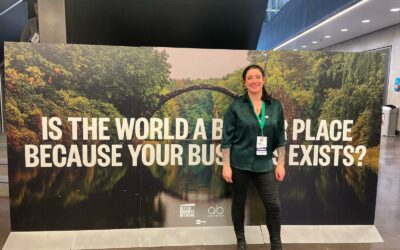I read a lot of news about the climate crisis, and in particular, the impact of the advertising industry. I am under no illusion there is an enormous (and at times scary) challenge ahead of us as we all hurtle towards the 2030 and 2050 climate deadlines, writes Lucy Cook, Senior Strategy and Planning Manager at Wavemaker UK.
We are not yet doing enough to reduce the impact of our work but I for one am really pleased to see the tide turning. When I first started working in the industry just five years ago, the topic of sustainability wasn’t really spoken about, now it’s on everybody’s lips.
Good advertising can have a powerful impact on consumer behaviour, offering us a huge opportunity to positively shape society in service of a more sustainable future. So, in this article, I’m challenging us all to be more optimistic about the change we’ve seen so far and the huge opportunity for change ahead of us. Because let’s face it, the problem is not going away. If we lean into it, and tackle it head on with a positive outlook – greater change and action will come.
So here are some reasons to be cheerful as we look to the year ahead.
Sustainable brands
It’s easy to be cynical in the face of so much greenwashing from brands. But there are brands out there doing genuinely good things – who didn’t love Yorkshire Tea’s “Tiny Kettle” campaign, encouraging us all to brew more planet friendly? They’re a brand genuinely working to improve its value chain, not just talking the talk.
And through organisations such as Ad Net Zero, the industry is taking action too. It’s early days, but I am proud to see agencies moving towards conscious planning and decarbonisation versus a reliance on carbon offsetting.
At Wavemaker, our econometrics modelling now understands the carbon impact of a media plan by channel – this is super exciting as it means brands can understand both campaign effectiveness and carbon impact in the same space. We also now make it mandatory for clients to opt out of the use of carbon reduction strategies on media plans.
Of course, there remains an intention gap when it comes to what consumers say versus what they do, but this also offers brands an exciting opportunity to nudge consumers towards more sustainable choices, especially in the current economic climate.
We know that trust in the government is at an all-time low, businesses are now much more trusted. This means consumers are looking to brands to help drive real change. In fact, a survey from Futerra found that a staggering 88% of participants stated they wanted brands to help them live a more environmentally friendly and ethical lifestyle.
So, although there is a temptation to default to short-term strategies focused on price in a cost of living crisis, I truly believe the brands that are ahead of the curve in making it easier for consumers to live a sustainable lifestyle will be the ones who will reap long term success.
Many consumers don’t expect brands to be perfect
But of course, sustainable business practices go well beyond marketing efforts, and brands shouldn’t be scared to communicate the journey they are on.
Consumers value transparency. And yes, while greenwashing should absolutely be avoided to build trust, many consumers don’t expect brands to be perfect right now, because they’re also not – and there is no shame in acknowledging this imperfection. Take IKEA, for example, they are on a journey to being sustainable as a business but are still activating (and winning awards) for their “The Sustainable Everyday” campaign – which aims to influence consumer behaviours by encouraging them to extend the life of their IKEA products instead of re-purchasing.
Our industry can sometimes fall victim to short-termist approaches to success, but when it comes to sustainability, we must think long-term. Sustainability may not be high on everyone’s agenda, but we all have a collective responsibility to drive the change that is needed.
My hopes for 2023 are to see the industry become united in its approach to reporting on carbon emissions, this will make conscious planning and carbon reduction much easier. I also hope to see it all become a bit simpler for us to navigate. I have an interest in this topic and still find it such a minefield with the amount of terminology and industry bodies.
Finally, I encourage you all to engage further with the challenges ahead – educate yourselves and be inquisitive because the brands you work with are tackling the same challenges and will soon be looking to you for support and advice.









